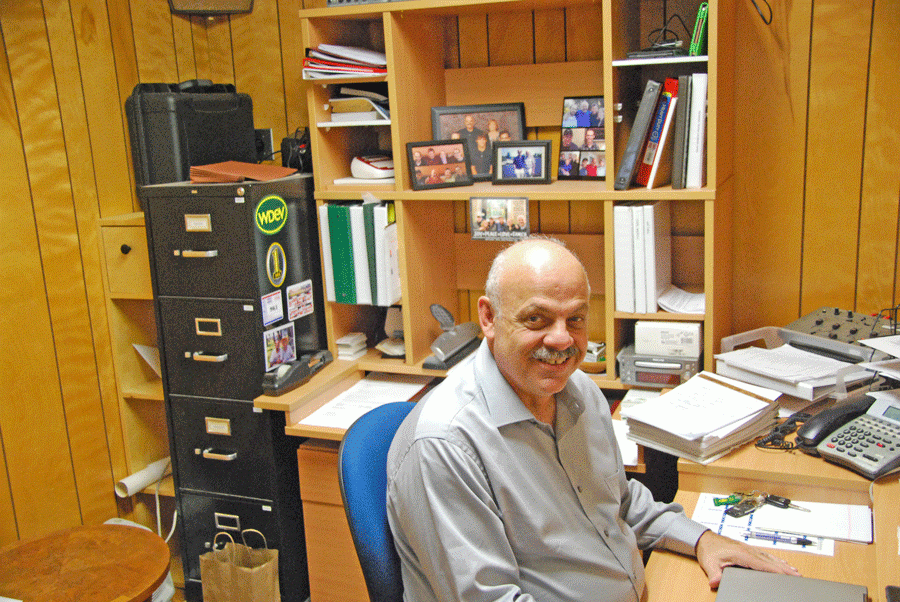WDEV: We’re on air
I’m going to try not to let this article turn into a straight love note to WDEV, but I don’t know if I’ll succeed. The radio station has been a fixture in central Vermont my whole life. Every time I tune in, I am grateful for the unpretentious way it makes the Central Vermont community feel like a real community.
WDEV is a locally owned commercial radio station in Waterbury. It has been independently owned by the Squier family since Lloyd Squier started it in 1931. His son, Ken Squier, is 84 years old now. He is something of a living legend to many WDEV listeners. In my family, he is most famous for his eclectic Saturday morning show Music to Go to the Dump By.
I get to WDEV just as the broadcast day began at 5 a.m. Lee Kittell is already on air. Kittell gets to the station at 3:30 most mornings. He collects news and sports reports, cues up sound clips, and prepares to go on the air. When the broadcast day begins, he reads the news, and plays music for his Music Almanac show.
At first I’m quiet, not wanting to distract him. But soon I realize that he’s a pro, and can toggle between conversation and announcing without skipping a beat.
During a commercial break, we get to talking. “I love working here,” he says. “There’s no other radio station like DEV. The rest of them are all like a satellite dish and a sales staff.”
“I figured I’d make my money talking to people somehow, and the only way to do that is being a politician or a lawyer, or a radio person,” he continues.
At 5:30 or so, Dana Jewell comes in. Jewell and Kittell man the studio until around 1:00, fluidly switching between talking on air, taking phone calls, printing out news stories, and supporting each other in whatever way is necessary.
It’s clear they are having a total blast. They sit in opposite studios separated by a pane of glass. Kittell announces that Jewell will join him on the air, and Jewell responds silently with a goofy thumbs up. During the news service, they take turns reading stories they printed off. They point enthusiastically at each other to switch when they’re finished reading a story.
Jewell is effortlessly charismatic in a very Vermont way. He’s a bit of a ham, but also genuinely excited to talk to anyone about anything. While Kittell is holding down the mic with sports news, Dana keeps up a patter of cracks about the ads and the interview clips being played.
We chatted while he searched for stories to read at the next news time, which happens every hour until 9:00. It’s a Monday, which means that news is a little thin, since most news organizations de-staff on the weekends. “When we get down to the bottom of the stack, here we are talking about the Bennington courthouse is changing its hours,” says Jewell, referring to a story that Kittell had read earlier. “Yeah, not only does nobody care but that’s not even in our listening area.”
In essence, is Jewell and Kittell’s job is to make guests and listeners alike feel like friends chatting over coffee. They are masters. Jewell talks with a local flower shop owner on air in a live call in advertising spot. They talk about the latest deals and goings on at the shop, but it sounds nothing like an ad. They also talk about the weather, and her husband’s maple sugaring operation. Jewell says that they have a huge waiting list of businesses wanting these ad spots, and It’s easy to see why. By the end of the conversation, it feels like we’re friends with the flower shop owner, and we might stop by the shop just to chat. It’s hard to find better marketing than that.
The next show is The Trading Post. Listeners call in to sell or request everything from buzz saws to dictionaries to trucks to animals. This show is a WDEV tradition, stretching back long before Kittell and Jewell came to the station in the early 2000s. Kittell takes calls in one studio and gets each caller’s name and town. He writes the information on a piece of paper and sticks it against the window to Dana’s studio, held in place by a power strip. The papers prepare Jewell to receive calls on air in an already familiar fashion. “Let’s head over to Barre to see what’s cooking with Elaine,” he says, as if he’s known Elaine for years.
Jewell is completely in his element. He seems to relish every moment, bantering with callers. When the commercial break comes, he drums his fingers on the table, turns to me, and says, “I get paid for this!”
At 9:00, it’s time for the Dave Gram show. This is the daily public affairs interview and call in show. This is the show that I catch most frequently in my car. Dave Gram has all the qualities needed for the host of any public affairs show: he’s knowledgeable about the issues and is a good interviewer. But he also has that same welcoming communal quality that Kittell and Jewell do. Unlike public radio talk shows that seem to dispense with callers as soon as possible to let guests speak, Gram lets the callers talk. Again, it just feels like people chatting over coffee. It falls in line with WDEVs egalitarian spirit, breaking down the barriers between the ‘important’ public figures that come on as guests, and the community. When I hear the show, it gives me the sense that whatever issue Vermont is struggling with, we’re all in it together. The show is a refreshing change of pace from the intense partisan distrust that permeates the national discourse. Instead, in this wonderful little bubble, Dave creates a culture that assumes best intentions, looking at how each perspective can add to the conversation. It’s a world I want to live in.
Unfortunately, Dave is out sick this morning, so I can’t gush about his show to his face. Colin Meyn from VTDigger is subbing in for him. While Meyn does the show, Jewell is in the adjacent studio with me, handling the ad breaks and getting callers’ info. It’s not a labor intensive job, so he regales me with anecdotes from his years of live radio broadcasting. Much of Dana’s humor is in just enough delightful bad taste to keep off the record.
Colin comes into the room at the end of a commercial break. “Is it Emily McKenna on the line?” he asks.
“I think so,” says Dana.
The music plays, cuing the show back in. Meyn rushes back into his studio, re-introducing the show as he’s sitting down. As Meyn starts the show again, Jewell says, “It was a woman, I remember that.”
“Our next guest is Emily Mckenna,” says Meyn.
There’s a pause, and the woman on the phone says, “Actually it’s Kim Farnham.”
Dana and I crack up. “That’s live radio.”
Eventually I venture downstairs to the business offices for the station. I meet with general manager Steve Cormier (known affectionately around the station as “Corm”). Steve says the station is always oriented towards staying local, relevant and serving the community.
“We want to make sure that the public gets the information they need,” Steve says. “This station is legendary for the coverage during [Tropical Storm] Irene. Stayed on the air all night long, people were taking calls in their cell phones to relay messages; they won an award from the House of Representatives… I mean, that’s what radio is all about”
Steve notes other ways the station tries to serve the community by providing local and regional news and having reporter dispatches in small town parades and the Tunbridge World Fair.
Steve says that staff at the station get along well. “It’s not like a commune…” he says, searching for something to compare it to. Some folks, he says, have been here for 36 years. He says that the station culture is somewhat self-perpetuating. “People know of WDEV. And when we’re looking to hire, the people that apply here want to be a part of what this station has been all these years. So it’s not like I have to sit down and kind of lecture him about what you need to be.”
Finally, I get to interview Ken Squier himself. From the way everyone acts, you can tell he is widely respected and beloved. We sit down in his office, surrounded by remnants of the station’s long history, from old photos to the original microphone. At 84, his hands shake a little as he drinks his coffee. But his demeanor is solid and composed. He talks slowly, every sentence clause forming its own discrete chunk. I ask him one question, which launches him into an almost hour-long oral history of WDEV. I know I’m not getting any paper-friendly sound bites, but I’m absolutely transfixed.
He weaves together the station’s quixotic beginnings, the history of the town of Waterbury, his own birth just down the street. It’s clear that the focus on local, community relevance has been there from the start. Once it meant bringing in local country bands to play on air. At one point each small town had its own show. During World War Two, WDEV shared it’s building with Western Union and helped keep track of Vermonters wounded or missing in action.
WDEV can be heard from the Johnson campus at 96.1 FM and 550 AM.

Senior, Professional Studies
Grew up in East Montpelier, VT
Fall 2019 - Present
In my spare time that I pretend I still have, I play saxophone...







